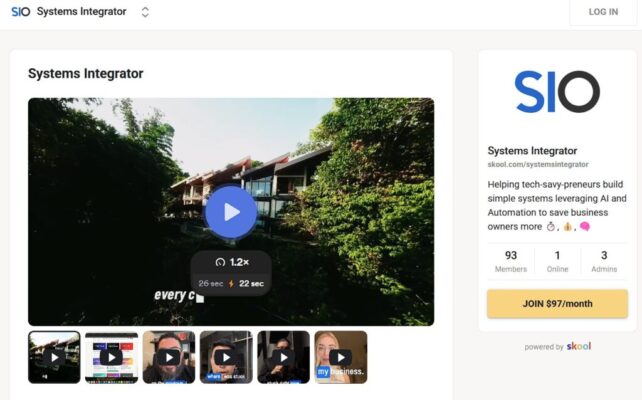Preston Rhodes – SYSTEMS INTEGRATOR
Original price was: $98.00.$18.00Current price is: $18.00.
- 24/7 Contact Support & Fast Chat
- Original Courses HD Quality
- Courses Are Updated
- Checked Download Links
- Guaraneed Safe Checkout
Description
Preston Rhodes – SYSTEMS INTEGRATOR

Master the Art of Systems Integration with Preston Rhodes’ SYSTEMS INTEGRATOR Course
In an increasingly digital and automated world, integrating various systems within a business is an invaluable skill. Preston Rhodes, a recognized automation and systems integration leader, has developed the SYSTEMS INTEGRATOR course, designed to equip professionals with the knowledge and skills needed to excel in this highly specialized field. This course covers all aspects of systems integration, focusing on automation, project management, and practical implementation.
Whether you’re new to automation or looking to enhance your skills, SYSTEMS INTEGRATOR provides a comprehensive learning experience that empowers you to successfully integrate complex systems within any organization.
Who Is Preston Rhodes?
Preston Rhodes is a seasoned automation and systems integration expert, with extensive experience selling and managing automation projects. He has established himself as a prominent figure in the tech industry, sharing his insights and expertise through platforms like YouTube and various online channels. Rhodes has developed a strong reputation for his practical approach to solving integration challenges, helping businesses streamline their operations and improve their efficiency through effective systems integration.
Having worked on numerous projects, Preston understands the nuances of both the technical and business sides of systems integration. His hands-on experience gives him the unique ability to provide real-world examples and case studies that add depth to his teachings. Through the SYSTEMS INTEGRATOR course, Rhodes offers learners an opportunity to tap into this expertise and apply it to their own careers or businesses.
What Is the SYSTEMS INTEGRATOR Course?
The SYSTEMS INTEGRATOR course is a structured, comprehensive training program designed for individuals interested in learning the ins and outs of systems integration, especially with a focus on automation. The course is particularly beneficial for those looking to build or expand their career in the tech industry, as systems integration is at the heart of modern business infrastructure.
The course is likely designed with the following components:
1. Defining Needs and Goals
One of the first steps in systems integration is understanding the needs and goals of the business or project. In this section, learners will be guided on identifying the specific objectives for their integration projects. This is an essential step in ensuring that the integration process aligns with the organization’s overall business strategy and objectives.
2. Research and Evaluation of Technologies
Systems integration often involves selecting and combining various technologies to meet specific goals. In this module, learners will explore how to research and evaluate different technologies, taking into account their compatibility, potential, and scalability. This step ensures that the right technologies are chosen to meet the business needs effectively and efficiently.
3. Project Planning
The success of any systems integration project relies heavily on detailed project planning. This segment teaches learners how to create a project plan with clear timelines, resource allocation, and risk management. Effective planning is crucial for delivering integration projects on time, within budget, and without unexpected issues.
4. Team Assembly
To implement a systems integration project, it’s essential to assemble the right team of professionals. This module will cover identifying and hiring the best talent, including systems engineers, software developers, and other technical experts, to ensure the project runs smoothly.
5. Installation and Integration
The practical application of systems integration techniques is at the heart of the course. This module focuses on installation and integration, where learners will be shown how to integrate hardware and software components effectively. They will also learn how to troubleshoot common issues and optimize the integration process for efficiency.
6. Project Management and Scalability
Scalability is a key consideration when designing systems integration projects. In this final module, learners will explore how to scale their integration solutions to meet growing business demands. The course also emphasizes project management techniques to ensure that large, complex integration projects can be handled with ease.
Key Features and Benefits of the Course
Although specific details about the course’s features are not readily available, it is likely to include a variety of elements that are standard in high-quality online courses, such as:
Practical Insights
With Preston Rhodes’ vast experience in automation and systems integration, the course is likely filled with real-world examples and case studies from actual projects he has managed. These insights provide invaluable learning opportunities for learners to understand how theory applies to real-life situations.
Business Model Focus
Systems integration isn’t just about technical expertise; it’s also about understanding the business models behind integration projects. This course focuses on teaching participants how to monetize their skills and projects, ensuring that they can successfully leverage systems integration as a business opportunity.
Scalability and Flexibility
Scalability is a core concept in systems integration, and the course will likely address how to build systems that are capable of growing with the business. Additionally, the self-paced learning format allows participants to absorb material at their own speed, making it flexible for those with busy schedules.
Clear Layout and Objectives
One of the course’s standout features is its clear structure. The course is designed to guide learners through each step of the systems integration process, from understanding the goals to implementing and scaling the systems. Each module will have well-defined learning objectives that help students track their progress.
Engaging and Interactive Content
The SYSTEMS INTEGRATOR course likely includes engaging and interactive content such as videos, quizzes, and discussion forums to maximise learning. This allows learners to actively engage with the material, reinforcing their understanding and retention of key concepts.
Expert Tutor Support
Participants in the course will likely have access to Preston Rhodes’ expert guidance throughout the learning process. His wealth of knowledge can provide answers to specific questions and help learners navigate challenges that may arise during their studies.
Comprehensive Resources
The course will likely provide learners with the necessary tools and resources to succeed. This may include templates, checklists, and guides that help streamline the systems integration process and ensure that learners can apply the skills they’ve learned immediately.
Benefits of the SYSTEMS INTEGRATOR Course
Enrolling in the SYSTEMS INTEGRATOR course offers numerous advantages for participants looking to enhance their career or business in systems integration and automation. Some of the key benefits include:
1. Flexibility and Convenience
With the option for online learning, the course offers the convenience of studying at your own pace and from anywhere in the world. This makes it easy for professionals with demanding schedules to advance their skills without disrupting their daily routine.
2. Career Advancement Opportunities
The skills gained from this course are highly sought after in various industries, especially those focused on automation and system management. Participants can position themselves for career advancement or even new job opportunities in the tech sector by learning the techniques and strategies used in systems integration.
3. Cost-Effectiveness
Compared to traditional in-person classes or certification programs, the SYSTEMS INTEGRATOR course is likely a more cost-effective option. With a one-time payment or reasonable tuition fees, learners can access top-tier training that prepares them for a successful career in systems integration.
4. Skill Development
By enrolling in this course, learners will not only improve their technical skills in systems integration but also enhance their project management and team collaboration abilities. These skills are valuable assets in any professional setting and can help learners succeed in complex, multi-faceted integration projects.
5. Real-World Knowledge
The course is likely based on real-world applications, providing learners with a deep understanding of how systems integration works in practice. This knowledge is invaluable for anyone looking to enter the field and start implementing integration projects immediately.
Conclusion
Preston Rhodes’ SYSTEMS INTEGRATOR course provides aspiring systems integrators with the tools, skills, and knowledge needed to succeed in today’s tech-driven world. With a focus on automation, scalability, and practical application, the course is a perfect fit for those looking to enhance their career or business in systems integration. The flexibility of online learning, combined with expert guidance from Rhodes himself, makes this an invaluable resource for anyone looking to master the art of systems integration.
Whether you are looking to pursue a career in automation or streamline business processes for your own company, this course offers the expertise and actionable insights you need to thrive in the ever-evolving field of systems integration.









